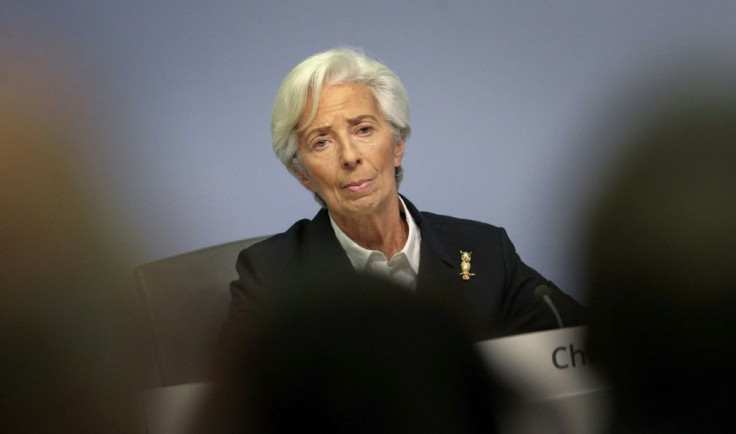ECB To Accelerate Bond Buys On Rates Fears
The European Central Bank said Thursday it would significantly ramp up the pace of its pandemic emergency bond buys, in a bid to soothe market jitters about a rise in government borrowing costs.
The move is aimed at preventing an "undesirable" early end to cheap money when the eurozone economy still needs ample support to recover from the pandemic, ECB chief Christine Lagarde said.
Although risks to the 19-nation currency club have become "more balanced", Lagarde said ongoing Covid shutdowns were weighing on the economy in the short term.
Uncertainty also remained over the speed of vaccinations and the threats posed by virus variants, she added.
"In these conditions, preserving favourable financing conditions over the pandemic period remains essential," Lagarde told a press conference in Frankfurt.
Global markets have been roiled recently by a rapid rise in bond yields, triggered by signs of higher inflation on the horizon.
Investors fear faster price growth could force a hike in interest rates that would make borrowing more expensive, hampering the recovery in the virus-stricken eurozone.
The ECB's 25-member governing council on Thursday decided that the pace of its purchases under the pandemic emergency bond-buying scheme known as PEPP would be "significantly higher" over the next quarter.
The 1.85 trillion euro ($2.2 trillion) scheme, set to run until March 2022, is the ECB's main crisis-fighting tool.
Observers had predicted that the ECB would stop short of expanding or extending the scheme and would instead opt to "frontload" PEPP purchases to counter the market turmoil.
The massive debt purchases are aimed at keeping credit flowing in the eurozone to encourage spending and investment.
The ECB also left the rest of its ultra-loose monetary policy unchanged, which includes super cheap loans to bank and interest rates at record low and even negative levels.
Government bond yields fell on Lagarde's comments, with the yield on Germany's benchmark 10-year bond dropping by 2.3 basis points to minus 0.336 percent.
European bond yields haven't seen quite the same surge of late as US Treasury yields, which is driven by optimism about the US economy as well as anxiety about higher inflation from Washington's $1.9 trillion stimulus plan.

Yields are closely watched because they serve as a guide for bank lending rates.
Lagarde, however, underlined that the bank was not in the business of managing yield movements, in an apparent attempt to ward off criticism that the ECB might be straying from its mandate.
Pictet Wealth Management strategist Frederik Ducrozet said the remark was not "particularly useful" given that market participants "are assuming that it is exactly what the ECB is doing".
He said weekly PEPP purchases had averaged almost 14 billion euros since the start of the year, "so we would expect this pace to increase to over 20 billion euros on average over the next quarter".
The ECB's mandate is to keep inflation just below 2.0 percent, a target that has been out of reach for years.
In the latest quarterly forecasts unveiled by Lagarde, the ECB sees inflation jumping to 1.5 percent this year, up from an earlier estimate of 1.0 percent.
Next year, inflation is predict to run at 1.2 percent, up from a previous forecast of 1.1 percent.
But Lagarde stressed that the increases were driven by higher energy prices and "temporary factors" such as pent-up consumer demand as virus curbs are relaxed.
"We will see through that," she said.
For 2023, the inflation outlook remained unchanged at 1.4 percent, still far off the ECB's goal.
Many curbs on public life remain in place as eurozone countries struggle to bring down coronavirus infections, while the European Union's much-criticised vaccination drive lags behind countries like the United States or Britain.
Nevertheless, the ECB defied observers by slightly raising its 2021 growth forecast from 3.9 to 4.0 percent.
Lagarde also repeated her plea for governments to help reboot the economy through fiscal stimulus.
She urged EU member states to quickly implement the bloc's planned 750-billion-euro virus recovery fund, saying it had a "key role" to play.
© Copyright AFP 2024. All rights reserved.





















